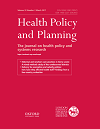Mitigating regulatory impact: the case of partial price controls on metformin in India.

The use of drug price controls is a contentious issue globally. Low- and middle-income countries use direct price controls to improve access to essential drugs. But such price controls have little meaning if they are not designed and implemented well, and the extent to which firms coordinate in these countries to weaken price controls has been largely overlooked. In mid-2013, India adopted partial price-cap regulation for some, but not all, formulations of several essential medicines. Using data on sales and prices of the out-of-patent oral antidiabetic drug Metformin—considered essential by WHO since 1998—and employing the differences-in-differences methodology, we examine the impact of the regulation on curbing prices. We find that firms coordinated to increase the price of the regulated formulation in the period before regulation, which led to a higher ceiling price. We also find, using triple-differences analyses, that the coordination is stronger among larger firms and for time-release formulations. We present anecdotal evidence to suggest that pharmaceutical trade associations facilitated coordination among firms, and we conclude that partial price control of Metformin in India is, at best, a modest improvement over no regulation.
Mitigating regulatory impact: the case of partial price controls on metformin in India.

The use of drug price controls is a contentious issue globally. Low- and middle-income countries use direct price controls to improve access to essential drugs. But such price controls have little meaning if they are not designed and implemented well, and the extent to which firms coordinate in these countries to weaken price controls has been largely overlooked. In mid-2013, India adopted partial price-cap regulation for some, but not all, formulations of several essential medicines. Using data on sales and prices of the out-of-patent oral antidiabetic drug Metformin—considered essential by WHO since 1998—and employing the differences-in-differences methodology, we examine the impact of the regulation on curbing prices. We find that firms coordinated to increase the price of the regulated formulation in the period before regulation, which led to a higher ceiling price. We also find, using triple-differences analyses, that the coordination is stronger among larger firms and for time-release formulations. We present anecdotal evidence to suggest that pharmaceutical trade associations facilitated coordination among firms, and we conclude that partial price control of Metformin in India is, at best, a modest improvement over no regulation.
